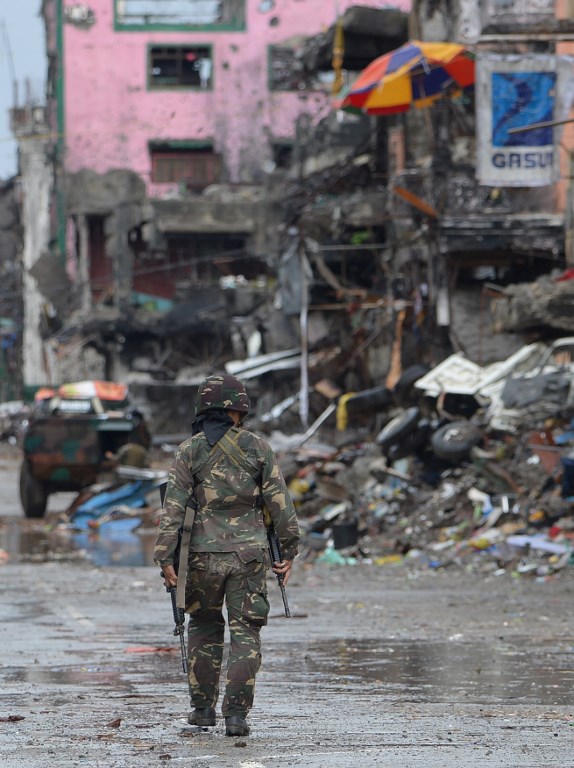Amnesty International accuses military of carrying out abuses in Marawi

This photo taken on October 17, 2017 shows a Philippine soldier walking past rubble from destroyed buildings in Marawi on the southern island of Mindanao.
At first glance, the endless rows of devastated buildings could be the aftermath of a great earthquake. But the punctured, bullet-riddled walls tell the true story of the Philippines’ longest urban war. AFP PHOTO
Abuses and violations of international humanitarian law were not only committed by the ISIS-linked Maute terrorist group but also by government security forces during the five-month siege in Marawi City, the Amnesty International reported.
“Marawi’s civilian population has suffered immensely amid one of the Philippine military’s most intensive operations in decades. Displaced en masse when the fighting began in May, thousands of people are now returning to a city that has been utterly destroyed in places, where civilians have been slaughtered by militants, and both sides have committed abuses,” said Tirana Hassan, Crisis Response Director at Amnesty International.
Based on the research of Amnesty International entitled “The Battle of Marawi: Death and destruction in the Philippines” released on Friday, the group detailed human rights analysis of the Marawi conflict.
The human rights group interviewed witnesses and survivors, who described how the militants committed extrajudicial killings, kidnappings and other violence all over the city.
The accounts of the interviewees detailed how the militants captured a large number of civilians as hostages, how they were forced into labor and used as human shields.
Article continues after this advertisement“Multiple witnesses described 10 separate incidents where militants killed a total of at least 25 civilians by shooting them or slitting their throats. Most were targeted because they were Christians, and some were killed as they attempted to flee to safety. It is a war crime to murder civilians,” the report said.
Article continues after this advertisementBut the Philippine military are also accused of torture and other ill-treatment.
The report said a member of the military detained a civilian who escaped, and was “beaten severely all over his body” that he later passed out.
“Many of the civilians trapped for extended periods were workers who were living in a state of fear, at risk of being found by militants and hit by bombs or bullets. An unknown number were reportedly killed by the government’s aerial bombardment,” the report said.
The group also said they could not determine whether the Philippine military’s use of artillery fire breached their international humanitarian law obligations because of restrictions on access to the city.
“Further independent investigation is needed to determine whether the infrastructure damage and the loss of civilian life were militarily necessary and proportional to the threat posed by the militants,” it said.
Hassan said the government must initiate a “prompt, effective, and impartial” investigation on the alleged abuses and whether the bombings were proportional under international humanitarian law.
The crisis started on May 23, when government forces tried to arrest Isnilon Hapilon, who was then the purported emir of the Islamic State in Southeast Asia. The battle lasted for five months and resulted in massive displacement of civilians and deaths of close to 1,000 people. /jpv
RELATED STORY